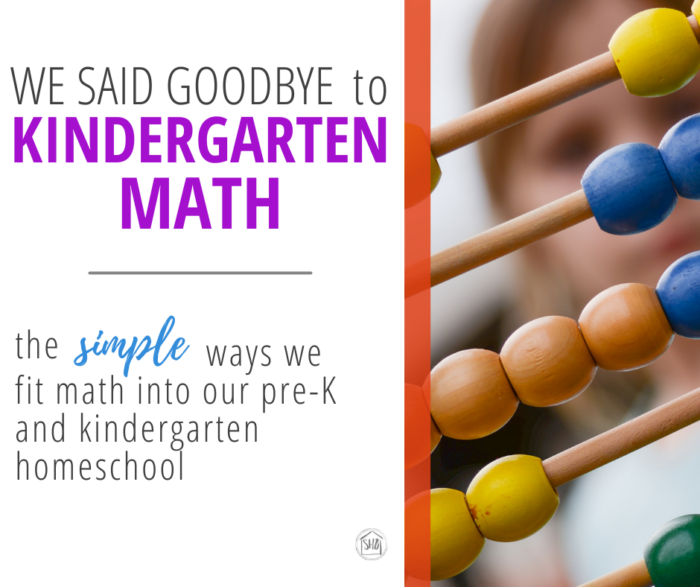
Three Days. That was all it took for me to go from hopeful homeschool novice to making a decision which would impact all the future kindergarteners in my homeschool.
I am not normally one to completely give up on something right out of the starting gate. But when we first started homeschooling, I gave up on kindergarten math about 3 lessons in. Yep – three, 1-2-3 lessons.
I thought we could go back later, when I had a little more patience. Later ended up being an entire year. Although we didn’t realize it at the time, we said good-bye to kindergarten math and never looked back. Years later and two more kids already through kindergarten and I have absolutely no regrets.
Is it time for you to say good-bye to kindergarten math, too? Or should you not even waste your time, energy, and money on a math curriculum for your kindergartner? I don’t know. But I don’t mind sharing my thinking behind my life-changing epiphany to help you decide.
This post may include affiliate links. If you click and make a purchase based on my recommendation, I get a small remuneration at no extra expense to you. I only recommend things I use and believe to be a blessing.
What Kindergarten Math Looked Like in our Homeschool
Let me fill you in on those three math days from the place of torment.
We tried a couple of “gentle” curricula to get us started: Life of Fred and another one I can’t even remember at this point. I figured my early reader would love math told in a story form.
Well…she liked the story a lot, but when it came time to work on the questions at the end of the chapter, we were sunk. I followed the instructions and when I showed her 2 + 3 = 5, I was stuck. She didn’t get it and I didn’t have a CLUE of how to explain it to her another way.
I took a deep breath and tried again.
Day 2.
Still nothing.
Day 3.
And now we are done.
Why I Didn’t Stress
I beat myself up about this failure for a little bit – “Why can’t I explain this? Am I ever going to be able to teach my kid math?” All those questions and frustrations I just pushed aside. I took a good look at what my kid already knew and what I assumed a kindergarten kid would learn in kindergarten math. And I told myself, “She will be fine.” She already knew SO many math concepts from our daily life.
Early Math Concepts in Preschool
We had spent quite a bit of time with a Calendar and the Days of the Week during our preschool years. So, my kid already had some basic concepts regarding time. This apparently is a BIG focus for kids in kindergarten.
We had also already learned all the shapes and colors. We could sort them, count them, compare them, etc.
The only thing we couldn’t do right out of box was add. Taking a deep breath, I decided we were going to be OK.
When Math Doesn’t Look Like Math
I decided, when I said good-bye to kindergarten math, to shift my focus. We focused on the simple math facts in the Classical Conversations Foundations program we had chosen.
Classical Conversations focuses on early memorization of skip counting, basic formulas, and measurements and conversions. They don’t have a formal, walk me through how to teach my kid math program (yet). But they do have lots of songs to help the kids learn these super basic math concepts.
The songs and the activities we did were so much fun (here are my best tips for teaching skip counting in early elementary), we forgot we were doing math.
And from what I hear (from those in the know about these things) skip counting is a huge help for kids as they work through the early elementary years in math. It helps them to see the relationships between numbers. As I look back now with a 5th grader, a 4th grader, and a 1st grader (and another pre-K kid paying attention to everything in our homeschool), I can see this in practice.
My kids grasp concepts so quickly because of skip counting! When we are working on math concepts together the phrase, “Oh, that is like skip counting!” is often uttered. We also can identify and create math problems using the Identity Laws of Addition and Multiplication and the Commutative Law of Addition. (I couldn’t do that in high school!) When we come up to a measurement question we have little jingles in our heads to help us remember how many cups are in a gallon – you know the important stuff of life.
What we Do for Math in Kindergarten Instead
These are the things we did/do with our students during the “kindergarten” phase of learning to introduce math concepts whilst steering clear of worksheets and formal or formal curricula.
Manipulatives
We have the manipulative kit for the K-3 Saxon curriculum. This gets a LOT of play in our house. We use the hundred number chart with all the manipulatives to work on counting. We play with the geoboards and geobands (an absolute favorite around here). My kindergartener LOVES to set up dominos and knock them down. I haven’t exactly figured out how this will contribute to her future math success, but she sure likes it.
This is the set we have, so this is the set we use. I am sure there are tons of others out there.
Sensory Play
I have gotten away from this more since we started homeschool “official.” We need to get back to this! Our kids are making so many connections during sensory play time. Vocabulary, math, science…you name it. They are getting it through sensory play. I am by no means an expert on sensory play, but I can throw a sensory bin with colored water and some scoops and measuring cups together in a heartbeat. Play proceeds for hours from that small effort.
Child-led Math
Randomly, my younger kids will shout out some random math fact. “2 + 2 = 4!” And we will enthusiastically cheer her on. Then we will ask, “What’s 2 + 3?” Also randomly, my preschooler/toddler will point out a shape of some sort. Follow up questions ask her about other shapes, colors, quantities, what have you. This math learning stuff is happening if we just pay attention to the opportunities and take them when they arise.
Commitment to my farewell to kindergarten math is not a hard and fast, “Adios!” If one of my kids in the future needs or wants more formal math education, I will consider it. But the freedom we gave ourselves when we decided to remove it was life-changing. I just didn’t regret it. I didn’t feel a burden anymore. Almost six years and three students later, I am still not regretting it.
Where to Start When You are Ready for Formal Math
In the years since those first three days of our first kindergarten homeschool experience, I have learned a LOT. I had a homeschool mama friend recommend Saxon Math to me – she even gave me my Saxon 1 Teacher’s Edition.
Since I had struggled and floundered with the “teaching” portion of teaching math to a kindergartener, I knew I would need a math curriculum which walked me through every detail of what to say and do. Imparting mathematical wisdom was obviously not my strong suit. The Saxon Math curriculum was a life raft on the homeschool seas!
Saxon Math in the early years provides such a beautiful foundation for kids and parents. It is, in my opinion, a thoroughly Classical curriculum because it focuses on asking the child questions to elicit his observations, his understanding, and his growth in mathematical understanding. Saxon Math is built upon the twin pillars of Incremental Development – one concept taught at a time, and Constant Meaningful Review, where nothing is dropped after “mastery.”
I believe so wholeheartedly in the Saxon Math program that I teach it to all my kids – with all different learning styles – successfully! And I have never once felt overwhelmed or even thought about giving up.
If you are interested in checking out Saxon Math, please grab a copy of my primer for Starting with Saxon Math in the Early Years. It is full of information about the program, tips for teaching successfully, and resources to help YOU teach with confidence. You can get the primer here:
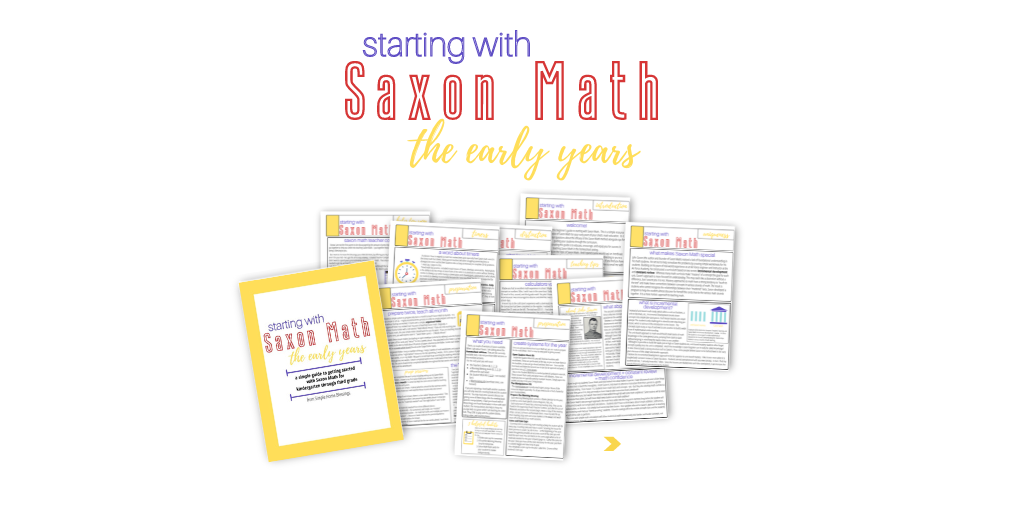
Have you removed the burden of a kindergarten curricula option, too? I would love to hear about your experiences! Leave a comment and share!
Looking for more information about our kindergarten homeschool experience?
Check out these articles:
- What Kindergarten Looks Like in our Homeschool…Really
- Our Favorite, Favorite Reading Program
- Beginning Homeschool with Classical Conversations
- Fine Motor Skills for Writing – Our Reluctant Writer
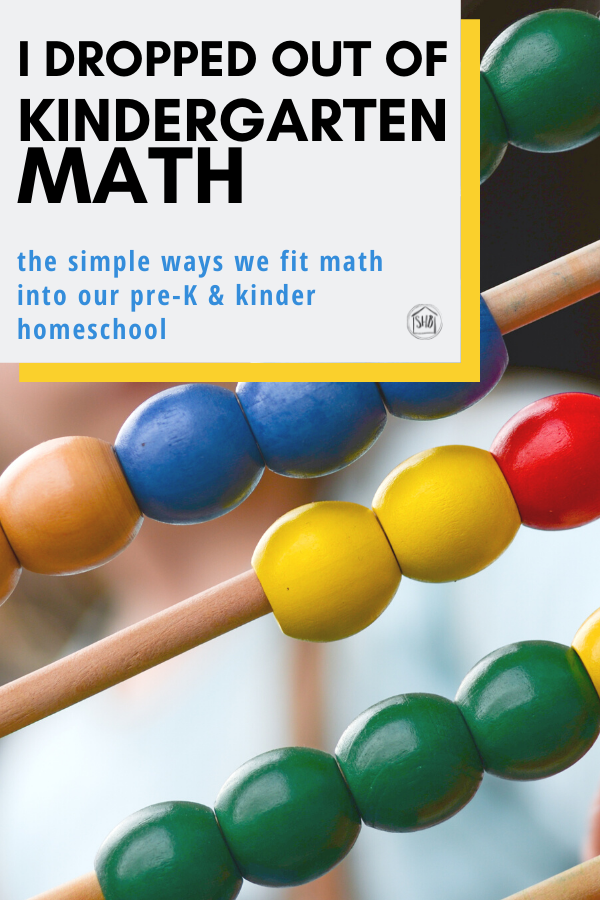

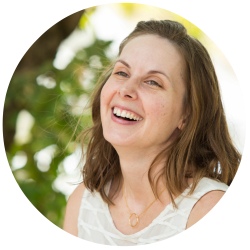


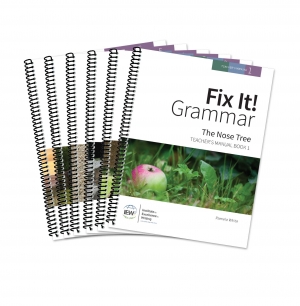
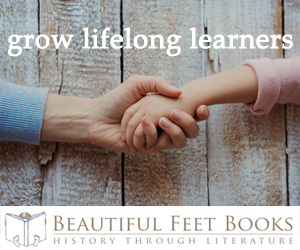

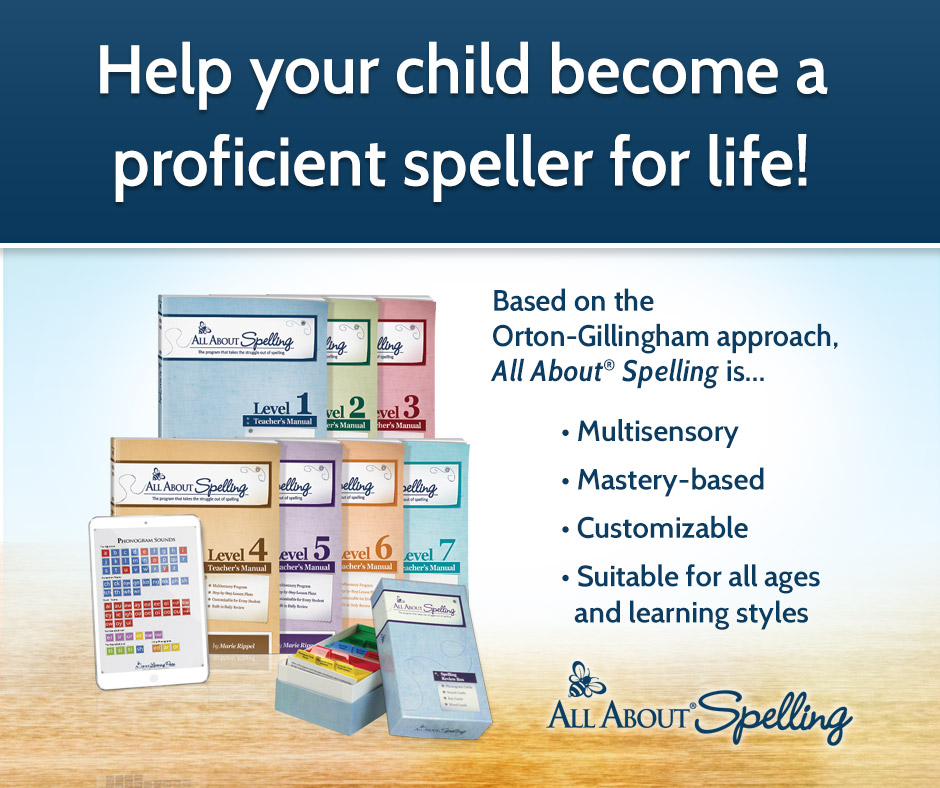

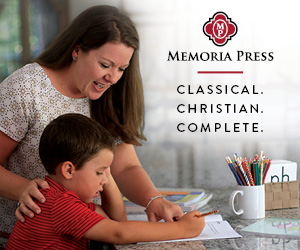

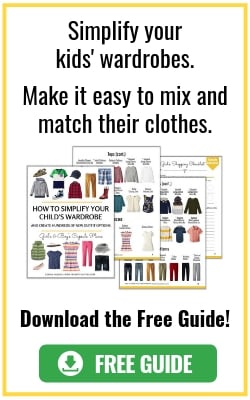


This Post Has 3 Comments
After 2 years of not using a math curriculum I just started Shiller Math and it’s wonderful and life changing! It’s the perfect supplement to Classical Conversations, which was also life changing for our family. You should check it out!
Since you skip the Saxon Kindergarten Math, do you start on Saxon 1 for their “1st grade year”?
Yes! In our experience, the students have already gathered much of the K information through everyday learning opportunities.